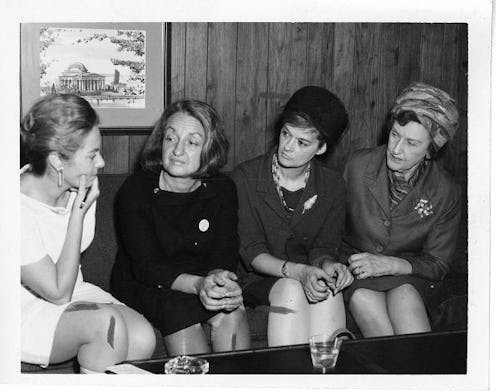Life
Feminist Quotes From The '60s That Still Ring True

The 1960s were a curious decade: Over the course of 10 years, American culture went from conformity-and-poodle-skirts to antiestablishmentarianism-and-hippies. Although second wave feminism didn't start gaining widespread traction until closer to the end of the decade, there are plenty of feminist quotes from the '60s that originated in the early half as well. After all, Betty Friedan's groundbreaking feminist text, The Feminine Mystique , came out in 1963, and it's widely credited with sparking the second-wave feminist movement.
After The Feminine Mystique criticized the rigid societal expectations that forced women into the roles of caretaker and housewife, feminists across the country began to openly question gender norms. Of course, the groundwork had already been laid for a resurgence of feminist ideology: French philosopher Simone de Beauvoir's The Second Sex was published in America in 1953, and the Food and Drug Administration approved the sale of oral contraceptives in 1960. However, there's no denying that Friedan's work jolting feminists into action; by the end of the decade, demonstrations like the Miss America protests in 1968 and '69 received national attention.
It should be noted that second wave feminism was largely defined by white, educated, middle-class women, and women of color were often ignored or put off. Fortunately, that's where contemporary intersectional feminism comes in — it's hugely important to recognize that different people have different experiences. That being said, it's equally important to respect the feminists who paved the way for gender equality today. Let's take a look at seven feminist quotes from the '60s below that are still relevant today.
1. "No woman gets an orgasm from shining the kitchen floor."
— Betty Friedan, American author
2. "Ideally, what should be said to every child, repeatedly, throughout his or her school life is something like this: 'You are in the process of being indoctrinated. We have not yet evolved a system of education that is not a system of indoctrination. ... What you are being taught here is an amalgam of current prejudice and the choices of this particular culture.'"
— Doris Lessing, The Golden Notebook (1962)
3. "Any woman who chooses to behave like a full human being should be warned that the armies of the status quo will treat her as something of a dirty joke. That's their natural and first weapon. She will need her sisterhood."
— Gloria Steinem, American activist and author
4. "The connections between and among women are the most feared, the most problematic, and the most potentially transforming force on the planet."
— Adrienne Rich, American poet and intellectual
5. "I write for those women who do not speak, for those who do not have a voice because they were so terrified, because we are taught to respect fear more than ourselves. We've been taught that silence would save us, but it won't."
— Audre Lorde, Carribean-American writer and activist
6. "Each suburban wife struggles with it alone. As she made the beds, shopped for groceries, matched slipcover material, ate peanut butter sandwiches with her children, chauffeured Cub Scouts and Brownies, lay beside her husband at night- she was afraid to ask even of herself the silent question — 'Is this all?'"
— Betty Friedan, The Feminine Mystique (1963)
7. "We, men and women, who hereby constitute ourselves as the National Organization for Women, believe that the time has come for a new movement toward true equality for all women in America, and toward fully equal partnership of the sexes, as part of the world-wide revolution of human rights now taking place within and beyond our national borders."
— National Organization for Women Statement of Purpose
8. "Let us begin the revolution and let us begin it with love: All of us, black, white, and gold, male and, female, have it, within our power to create a world we could bear out of the desert we inhabit for we hold our very fate in our hands."
— Kate Millet, Sexual Politics (1968)
Images: Wikimedia Commons (3)